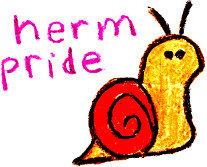

Main Menu
Resources
Projects
© Intersex Initiative
Unless otherwise indicated, you may copy, reprint, distribute, and even modify contents of this web site under the Creative Commons license.
In biology, "hermaphrodite" means an organism that has both "male" and "female" sets of reproductive organs (like snails and earthworms). In humans, there are no actual "hermaphrodites" in this sense, although doctors have called people with intersex conditions as "hermaphrodites" because intersex bodies do not neatly comform to what doctors define as the "normal" male or female bodies.
Intersex is defined as the "congenital anomalies of the reproductive system" (National Institute of Health), which include internal reproductive organs, external genital appearances, or genetic and hormonal systems that are "different" from most males and females. Not all "intersex" conditions are the same--"intersex" covers a wide range of medical conditions that are very different from one another; what makes intersex people similar is our experience, not our biology.
The current medical protocol calls for surgical "reconstruction" of bodies that are visibly intersex to socially and medically eliminate intersex bodies despite the fact that there is no long-term study confirming that such procedure is necessary, safe, or effective. The surgical concealment of intersex conditions typically takes place when the child is too young to comprehend or consent to such invasive and irreversible operations.
Since 1993, intersex people and our supporters have been organizing to end shame, secrecy and unwanted genital surgeries on children too young to give informed consent. As children, many children with intersex conditions grow up feeling confused, isolated and ashamed, not just because of the surgery and the silence that surrounds it, but also because of the repeated exposure to medical gaze as they parade through multiple doctors, nurses and medical students so they can look at our naked genital areas, poking and prodding (this happens to children with many other rare medical conditions also; within the disability movement, this practice is known as "public stripping").
In response, there is a growing current within the medical community to reconsider the surgical concealment of intersex bodies, although the official protocol has not yet changed. There is an increasing number of follow-up studies that show that, not only are surgeries detrimental to the child's emotional and sexual functioning, but they do not even deliver what they are intended to, which is the genital that looks "normal" and enables the individual to engage in "normal" heterosexual intercourse.
Contrary to the popular belief, intersex people are not suffering from a "gender" issue: most people with intersex conditions identify simply as a regular man or a woman. Therefore it is not the goal of the intersex movement to create a third gender category to raise intersex children in. Instead, we ask parents of intersex children to: 1) raise the child either as a boy or as a girl, based on the best available prediction of what the child will be most comfortable with, 2) delay all non-emergency surgeries until the child is old enough to understand and to have a say in it, and 3) be open to adjustment if and when the child decides that s/he wants to live as a gender different from his/her initial assignment. By postponing the surgery until the child is mature enough, we can preserve the widest range of possibilities for the child to choose from, and spare the child of a childhood rife with sexual and emotional traumas. We believe that a good medical practice is the one that pays attention to the person's overall quality of life, rather than simply to the appearance of one's genitals.
When doctors see an intersex child, they see a "gender" problem, and focus on fixing the child's gender identity and genital appearances. Some allies of intersex people view intersex as a gender "variation" that should be accepted and honored rather than an unacceptable gender "deviance" that need to be eliminated. But this approach is inadequate because it reproduces the same old framing of intersexuality as a peculiar gender phenomenon. We are calling for our friends to instead focus on the lived experiences of intersex people, which is about living through and healing from deep stigma and trauma.
To read more about intersex people's experiences, please pick up a copy of Intersex in the Age of Ethics ed. by Alice Dreger at your friendly local independent bookseller, or visit our web site at http://www.intersexinitiative.org.
Oh, and one last thing--we find the word "hermaphrodite" misleading, mythical, and stigmatizing. Although some intersex activists do reclaim and use this term to describe themselves, it is not an appropriate term to refer to intersex people in general. So, can we please use the word "intersex" instead when we are talking about humans? Snails are the hermaphrodites; humans are not.

This material is provided to you by:
Intersex Initiative
PO Box 40570, Portland OR 97240
Email: info@ipdx.org